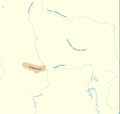The Pumpokolic languages (also known as the Arin-Pumpokol, depending on classification or Pumpolic languages) form one of the principal subgroups of the...
5 KB (398 words) - 13:32, 1 September 2024
spoken a Pumpokolic language based on linguistic and ethnogeographic data. For those who argue[when?] the Xiongnu spoke a Yeniseian language, the Yeniseian...
54 KB (5,078 words) - 00:13, 17 October 2024
Yeniseian people (category Articles containing Pumpokol-language text)
linguistic records, they are considered to be a Pumpokolic tribe, a theory supported by evidence of long-term Pumpokolic inhabitation in northern Mongolia based...
21 KB (2,361 words) - 23:07, 30 October 2024
Jie people (redirect from Chieh language)
spoke a Yeniseian language, further connecting them with the Jie people. Among the Yeniseian languages, Jie is hypothesized to be Pumpokolic. Vovin, Vajda...
20 KB (2,537 words) - 23:07, 30 October 2024
Huna? Dingling? Jie? Others consider these languages as being Pumpokolic or as belonging to other language families. Quiles, Carlos (2021-04-23). "Proto-Yeniseian...
3 KB (179 words) - 15:52, 17 November 2024
north, this finding lends credence to the possibility that Jie is a Pumpokolic language. The reconstructed vowels of Pumpokol are as follows, based off of...
13 KB (721 words) - 18:51, 3 November 2024
Yeniseian Assanic Pumpokolic Xiongnu Xiongnu-Yeniseian Yeniseian Para-Yeniseian Xiongnu ? Certain linguists posit that the Xiongnu spoke a language similar to...
30 KB (3,057 words) - 12:01, 21 November 2024
connection is dubious and Vovin suggested it to be a loanword, because if Pumpokolic speakers became part of Xiongnu, the word for army would have likely been...
8 KB (778 words) - 08:57, 19 October 2024
Proto-Yeniseic is the unattested reconstructed proto-language from which all Yeniseian languages are thought to descend from. It is uncertain whether...
8 KB (641 words) - 16:59, 18 November 2024





